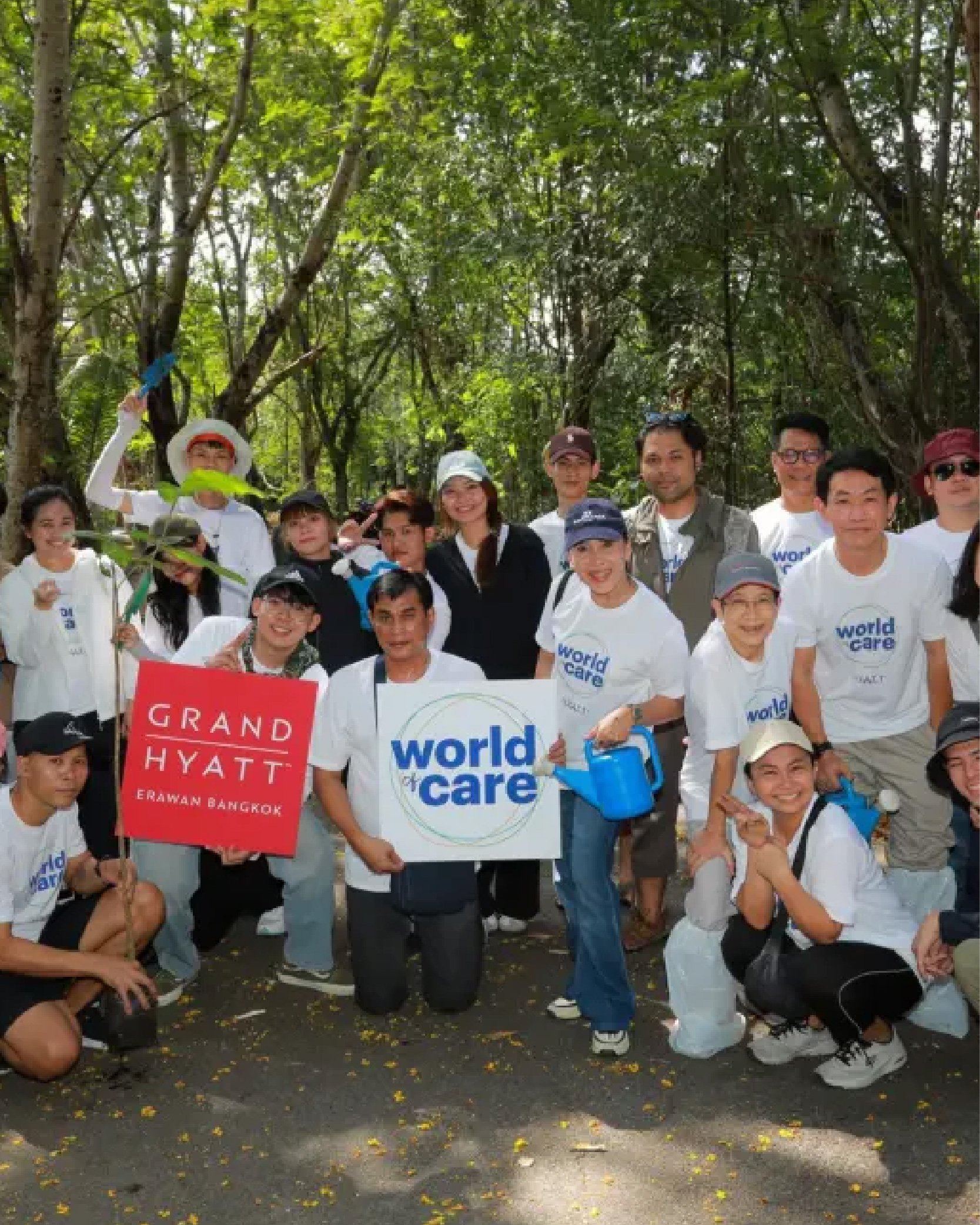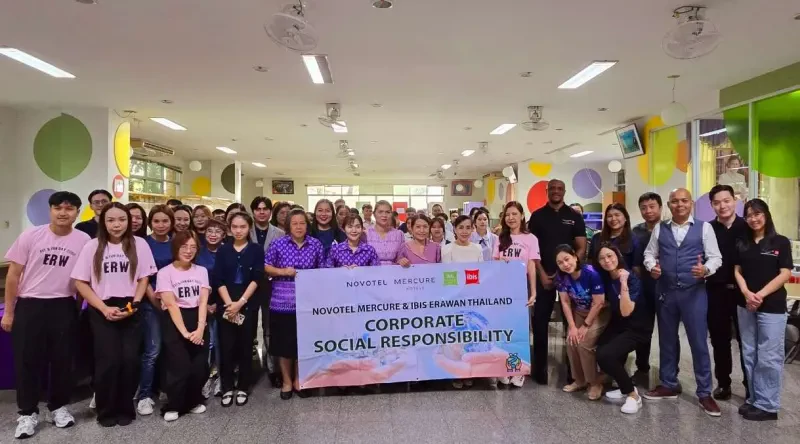The Company provides hospitality services that serve travellers’ demand in sustainable lifestyle, supporting collaboration for climate actions and addressing climate change risks.
The Company is committed to increase efficient of resource consumption to an optimum level and minimizing negative environmental impacts across project developments and hotel operations, with key priorities on environmental policies, Energy and Carbon Management, Food Waste Management, Materials and Waste Management, Water Resource Management policies.
Energy Efficiency Management
As a service-oriented business, the hospitality sector inherently requires substantial energy consumption both from hotel operations and guest activities, making energy reduction a complex challenge. At The Erawan Group, we are committed to enhancing energy efficiency by continuously improving our consumption practices, minimizing waste, and exploring innovative technologies and strategic partnerships. Energy usage remains a key factor influencing our carbon emissions, both at the corporate level and across our hotel portfolio, and we are dedicated to managing it responsibly while maintaining exceptional service standards.
Through strategic collaboration with our partners, we continue to enhance energy management across our operations. As our business grows, we remain committed to utilizing diverse energy sources efficiently and effectively, guided by the following principles:
Target
- Effective energy management with 2 percent decrease of energy intensity per year in order to reduce energy cost and align with the Company’s GHG emission target
- Increase percentage of renewable energy with coverage more than 10 percent of total properties by 2027
- All self-managed properties (100 percent) provide services that relate to the reduction of energy and carbon emissions
Business opportunities and risks
Opportunities
- Reduction of long-term costs from energy consumption
- Competitive advantages on cost for budget hotels
- Attraction for tourists with environmentally friendly conscious and promote their sustainable lifestyle
- Opportunities to access green finance
Challenges and risks
- Insufficient energy supply during high season
- Balance between energy reductions and customer satisfaction
- Electricity, fuel, natural gas, etc. are significant to business operations, however, these resources are also significant to carbon emissions
Management approaches
- Set goal, target, management approaches and monitor performances
- Increase energy efficiency in the properties’ common areas and guest room by maintenance and new technology
- Increase proportion of energy mix between traditional and renewable energy
- Promote sustainable lifestyle of customers
- Collaborate with sustainability partners
Electricity consumption (kwh.)
Year 2022
Year 2023
Year 2024
Remarks
2023-2024 was a recovery period for tourism industry in Thailand, resulted in an increasing number of tourists and energy consumption.
Operational Results
In 2024, the company collaborated with a group of partners to manage energy efficiently, promote diverse energy demands, and expand business opportunities alongside effective energy management.
Increase the ratio of renewable energy to replace electrical energy
- The Hop Inn hotel group began expanding its Solar Rooftop installations from May to November 2024, adding 8 buildings, bringing the total number of completed installations of Solar Rooftop to 11 buildings. The total size and capacity of the solar panels is 176 kilowatts, capable of producing 111,393 kilowatt-hours of electricity. This accounts for an average of 6% of the total electricity consumption across all 11 Hop Inn hotels.
-
The Marriott hotel group expanded its Solar Rooftop installations from April to July 2024, adding 3 hotels:
- JW Marriott Hotel Bangkok
- Courtyard by Marriott Bangkok, and
- The Naka Island, a Luxury Collection Resort & Spa, Phuket.
The total size and capacity of the solar panels is 655 kilowatts, capable of producing 472,966 kilowatt-hours of electricity. This accounts for an average of 5% of the total electricity consumption across the three hotels.
-
In 2024, the company expanded its installation of EV Charging Stations to provide convenience for hotel guests. A total of 11 hotels were equipped with EV charging stations, including:
- JW Marriott Hotel Bangkok
- Courtyard by Marriott Bangkok
- Novotel Ibis Styles Bangkok Sukhumvit 4
- Ibis Bangkok Riverside
- Ibis Bangkok Sathorn
- Ibis Bangkok Sukhumvit 4
- Ibis Phuket Patong
- Hop Inn Hua Hin
- Hop Inn Kanchanaburi
- Hop Inn Chonburi
- Hop Inn Chiangmai

Reduce electricity consumption
- Improved the efficiency of electrical appliances and upgraded the Chiller Plant system at JW Marriott Hotel Bangkok, resulting in a 26% reduction in electricity consumption, saving up to 2,559,506 Baht.
- The company has been committed to replacing regular light bulbs with energy-efficient bulbs since 2019, continuing this process through 2024, as part of the maintenance cycle, and including the installation of new lighting in new project construction areas.
- Installed Double Motion Sensors to enhance energy efficiency in hotel rooms and reduce unnecessary energy consumption.
Energy consumption of The Erawan Group
| Energy consumption | Unit | 2021 | 2022 | 2023 | 2024 |
|---|---|---|---|---|---|
| Electricity | GWh | 50.56 | 67.11 | 76.16 | 81.02 |
| Diesel | ML | 74.71 | 73.08 | 52.27 | 58.17 |
| Gasoline | ML | 24.78 | 16.46 | 10.52 | 15.94 |
| LPG | Tonne | 881.49 | 1,227.09 | 1,399.40 | 1,441.14 |
Remarks
- 2023-2024 was a recovery period for tourism industry in Thailand, resulted in an increase in number of tourists
- Excluded data of Foodcourt of Ploenchit center building as it was energy consumption of tenants
- Fuel consumption could be partially collected
- Calculated from total of electricity, fuel and LPG consumption
- The scope of this report is limited to operations within Thailand.
Water Management
Target
- 1 percent reduction in water withdrawal per year
- 5 percent reduction in water consumption per room per year
Business opportunities and risks
Opportunities
- Reduce operating cost from lower cost from water consumption
- Efficient water management allows the hotel to operate at full capacity year-round
Challenges and risks
- Distance hotels or on islands might face water shortages, especially during the high tourism season when water demand is high and during droughts when natural water sources are insufficient, potentially disrupting services.
Management approaches
- Regularly monitor water demand, assess wastewater quality, and check the hotel's wastewater treatment in all seasons
- Maintain equipment to ensure it remains efficient and functional. Use water-saving fixtures and low-water-consuming appliances
- Engage guests in water-saving campaigns
Performances
The Company is committed to sustainable water management, which includes sourcing water, recycling, and reusing it through water management policies and strategies. The Company complies with environmental laws, ISO 14001 standards, and other environmental regulations, focusing on improving efficiency and reducing water usage sustainably. In addition to using water-saving products, campaigns are held to encourage customers and employees to conserve water and choose environmentally friendly chemical products.
Beyond energy consumption, water is another heavily consumed resource in the hotel industry. The Erawan Group has guidelines to raise awareness and reduce water usage, including:
- Encouraging guests to reduce towel changes to lower water usage from laundering.
- Raising awareness among staff about the importance of using water resources efficiently.
- Installing aerators to reduce water flow from taps and choosing water-saving fixtures.
- Inspecting equipment, piping systems, and water meters to monitor, record, and continuously repair to prevent leaks.
- Creating rainwater storage in suitable areas.
- Implementing wastewater treatment systems and regularly checking the quality of water used by the hotel.
Water withdrawal
| 2022 | 2023 | 2024 | |
|---|---|---|---|
| Water withdrawal by third-party water (cubic meters) | 1,047,587.00 | 1,269,078.96 | 5,515,743.00 |
| Water withdrawal by surface water (cubic meters) | - | - | - |
| Water withdrawal by groundwater (cubic meters) | 145,096.00 | 146,815.00 | 111,067.00 |
| Water withdrawal by seawater (cubic meters) | - | - | - |
| Water withdrawal by produced water (cubic meters) | - | - | - |
| Intensity ratio of total water withdrawal to total number of employees (Cubic meters / Person / Year) | 320.53 | 350.21 | 1,310.39 |
| Intensity ratio of total water withdrawal to total revenues (Cubic meters / Thousand Baht of total revenues) (1) | 0.25 | 0.20 | 0.70 |
Additional Explanation:
1 Total revenues and expenses from consolidated financial statement
2 2023-2024 was a recovery period for tourism industry in Thailand, resulted in an increase in number of tourists
3 The scope of this report is limited to operations within Thailand.
2024 Water withdrawal
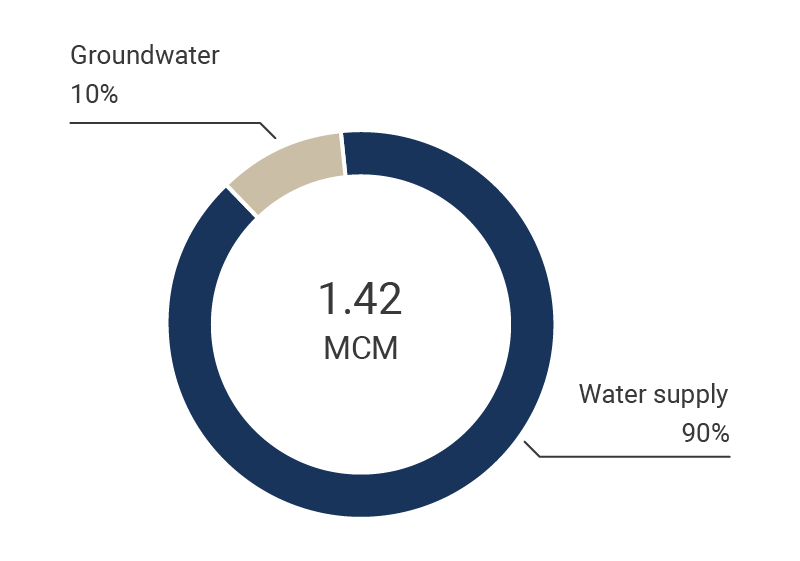
Water Stress
The Erawan Group recognizes the importance of responsible water management, particularly in regions facing water stress. In the fiscal year 2024, the Company operates 78 hotels across all regions of Thailand, some of which are located in water-stressed areas as identified using external water risk assessment tools, namely the World Resources Institute’s Aqueduct (https://www.wri.org/aqueduct). The assessment shows that a significant share of the Company’s hotels is located in areas classified as high to extremely high water-stressed areas, while others are in medium to low water-stressed areas. This disclosure enables stakeholders to better understand the Company’s exposure to water-related risks and the strategies adopted to manage them.
In water-stressed regions where the Company operates, we engage with stakeholders to address shared water challenges and collaborate on water-related initiatives and sustainable practices. These engagements include:
- Compliance with local water regulations and standards.
- Participation in community awareness programs to encourage efficient water use.
- Collaboration on water efficiency initiatives to secure long-term sustainable access to water resources.
- This approach reflects the Company’s commitment to sustainable water stewardship, aligned with international standards and stakeholder expectations.
- This approach reflects the Company’s commitment to sustainable water stewardship, aligned with international standards and stakeholder expectations.
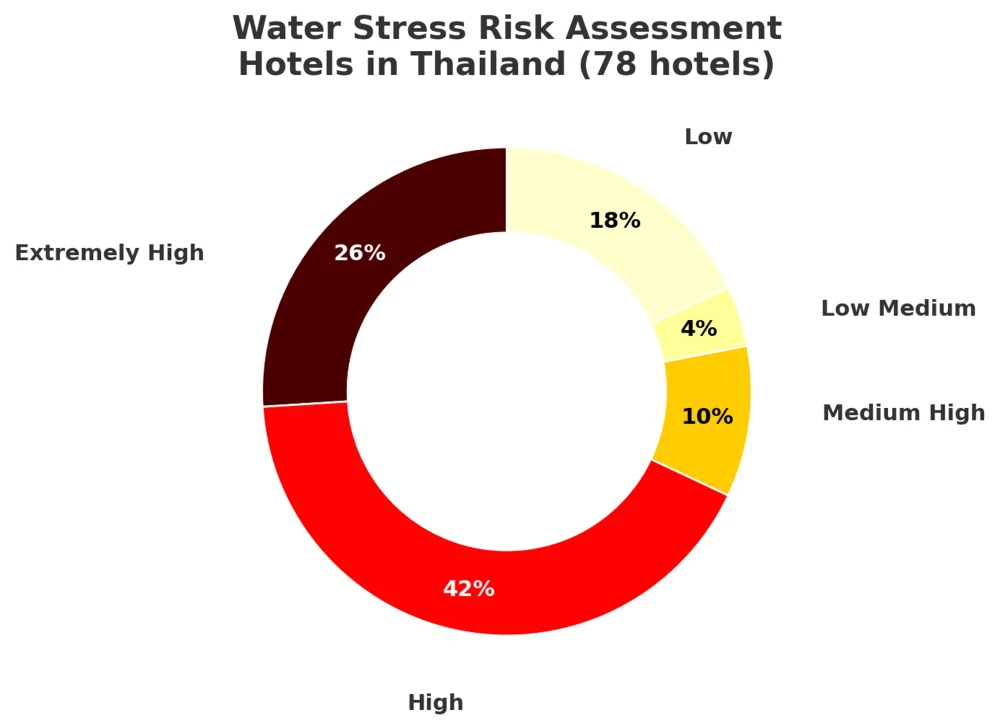
Carbon Management
Commitment towards climate actions
In the tourism and hotel industry, climate change plays a significant role, stemming from tourism travel, energy consumption to serve guests through various facilities, and even renovations and construction projects that must consider local conditions, geography, and climate change impacts.
The Erawan Group recognizes that running a hotel business requires careful consideration of various factors. They are committed to reducing their organizational carbon footprint across all hotels in the group. This commitment aligns with Thailand's Nationally Determined Contributions (NDC) to achieve net-zero carbon emissions by 2065 (B.E. 2608). The company has also outlined a long-term carbon strategy to support this goal.
Target
- Support the national target of achieving carbon neutrality by the year 2050 in Thailand.
- Ensure that all self-managed hotels (100%) provide services related to energy reduction and carbon offset by the year 2027. Practices for GHG emission reduction.
Scope 1 and 2 Greenhouse Gas Emissions TonCO2e
2021
2022
2023*
2024*
*The data has been verified by an external independent party.
Remark: In 2024, the Company achieved a reduction in carbon intensity despite an overall increase in total absolute greenhouse gas (GHG) emissions compared with the base year. This reflects significant progress in enhancing operational efficiency and managing emissions more effectively in line with business growth.
| Indicator | Unit | Year 2022 | Year 2023 | Year 2024 |
|---|---|---|---|---|
| Carbon Emission (Scope 1 and 2) | tCO2e | 16,452 | 20,541 | 22,959 |
| Carbon Intensity per Unit | ||||
| Guest Nights | Guest night | 2,316,959 | 3,045,172 | 3,208,813 |
| Carbon Intensity per Guest Night | tCO2e / guest night | 0.0071 | 0.0067 | 0.0072 |
| Rooms Sold | Room night | 1,605,712 | 2,083,807 | 2,195,413 |
| Carbon Intensity per Occupied Room Night | tCO2e / room night | 0.0102 | 0.0099 | 0.0105 |
| Annual Revenue (excluding scope 3) | Million THB | 1,611.90 | 2,629.17 | 3,071.51 |
| Carbon Intensity per Revenue (Thousand THB of Total Revenue) | tCO2e / thousand THB | 0.0102 | 0.0078 | 0.0075 |
Business opportunities and risks
Opportunities
Our hotel business caters to a diverse customer base both domestically and internationally, who are interested in different approaches to greenhouse gas management. Currently, we have corporate customers from both domestic and international markets who are interested in eco-friendly accommodation and hosting green meetings that can offset carbon emissions. If we focus intensively on this aspect, it can expand its customer base in the future. In addition, the Company would have an opportunity to access green finance.
Challenges and risks
The hotel business is a service industry that consumes a significant amount of energy, and a large portion of energy usage is driven by the guests themselves. This makes it challenging for hotels to have control or manage energy consumption effectively. Therefore, it poses a challenge for the company to achieve its carbon reduction goals. However, the company is making efforts to improve energy efficiency, construction practices, and adopt environmentally friendly energy innovations in its business operations.
Furthermore, there is an increasing demand for environmentally friendly hotel services from both individual customers and corporate clients. If hotels fail to adapt and meet these growing demands, they may miss out on long-term business opportunities in the future.
Management approaches
- Manage energy consumption in responding to determined target and plan.
- Increase the proportion of environmentally friendly energy on both hotel operations such as installation of solar energy and hotel facilities such as installation of EV charging station for hotel guests.
- Define carbon emission base year, reduction target, action plan, management approaches, in order to monitor, assess, and offset carbon emissions in both short- and long-term.
- Enhance sustainability partnerships within supply chain and external parties
- Provide knowledge on the responsibilities of hospitality service providers towards climate change to executives and employees at all levels.
- Upgrade hotels to meet Green Hotel standards and other environmental standards.
Performances
Since 2023, The Erawan Group has assessed and certified its Carbon Footprint for Organization (CFO) scope 1 and 2 with external verification. The company discloses its total direct GHG emissions (Scope 1) based on a reliable and auditable data acquisition and aggregation system. The company’s Scope 2 indirect GHG emissions are derived from the consumption of electricity. The company purchases electricity directly from the Metropolitan Electricity Authority (MEA) and the Provincial Electricity Authority (PEA). In line with the GHG Protocol guidance, the company reports market-based Scope 2 emissions equal to location-based emissions. The reported data covers 100% of hotels in Thailand under the operational control approach. All Scope 1 and 2 emissions are verified by an independent external third party, reflecting our commitment to transparency and accountability in climate-related disclosures.
- FY2023: Scope 1 emissions of 3,835 tCO2e/year, and Scope 2 emissions of 16,706 tCO2e/year
- FY2024: Scope 1 emissions of approximately 3,958 tCO2e/year, and Scope 2 emissions of approximately 19,001 tCO2e/year
The Company uses the data in order to set its carbon emission baseline and prepares for decarbonization and climate action plan. In addition, the Company also practiced its key business operations as following.
- SCG Cleanergy MOU to support consumption of solar energy for properties.
- BanpuNext collaboration to enhance energy efficiency within properties.
- EV Charging Station expansion to serve hotel guests with sustainable lifestyle
- “STAY FOR SANTA” initiative in collaboration with the Carbon Market Club to offset personal carbon footprint during 2023 Christmas and New Year festival. 332 tCO2e was offset from the initiative.
- ESG & Carbon Knowledge Sharing session for executives and employees
- 500 tree planting to increase green public areas in Bangkok and plantation of 20-rai mangrove to increase carbon absorption area in Nakhon Si Thammarat.
- In 2024, the company organized a tree-planting event, planting 200 trees at 50 Suk Park, Klongtoey District, Bangkok, on World Environment Day, June 7, 2024.
For Scope 3 emissions, the company recognizes the importance of measuring and reporting indirect GHG emissions across the value chain (Scope 3) in line with the GHG Protocol Corporate Value Chain Standard, as these emissions represent a significant portion of climate impacts and are critical for assessing long-term climate risks and opportunities.
At present, Thailand does not mandate Scope 3 reporting. The company is currently assessing data availability and evaluating methodologies for selected Scope 3 categories to explore potential future disclosures in alignment with international practices.
Environmental Management
Return on Environmental Investments
The company has established internal reporting processes that enable monitoring and recording of financial data related to environmental projects and programs across business units. Environmental expenditures and investments are tracked through budgeting systems and project-level reporting, enabling oversight at both corporate and departmental levels.
These processes support the company’s ongoing commitment to improving environmental performance, ensuring transparency in tracking financial data for environmental initiatives at the corporate level, and helping to prevent environmental degradation and negative incidents that could impact ecosystems or business operations.
Environmental Violations
The company is committed to strict compliance with all applicable environmental laws and regulations across its operations, supported by internal environmental management processes that aim to improve our overall environmental performance.
Over the past four fiscal years (FY2021–FY2024), the company did not have any violations, fines or accrued liability in an individual year related to environmental or ecological issues. This demonstrates the effectiveness of our environmental management practices in ensuring compliance and safeguarding both the environment and long-term business continuity.
Climate Risk Management
The company has integrated climate-related risks into its enterprise risk management (ERM) framework, which is aligned with COSO 2004 and embedded in the corporate culture. The framework is supported by the three lines of defense: operational managers (1st line), Risk Management Committee (2nd line), and Internal Audit (3rd line) providing independent assurance. The company maintains a Business Contingency Plan and conducts periodic monitoring of internal and external situations to ensure business continuity and timely response to unforeseen events.
The climate risk assessment covers a wide range of risk types, including:
Current Regulation
Risks arising from compliance with existing environmental laws and regulations in Thailand, such as requirements on energy efficiency, emissions reporting, and environmental standards already in force.
Emerging Regulation
Risks linked to potential new policies and regulatory changes, such as future government targets on carbon neutrality or adjustments to environmental tax or carbon pricing mechanisms.
Technology Risk
Risks related to technological changes in the hospitality and tourism industry, for example, the adoption of energy-efficient systems, renewable energy technologies, or waste management innovations that require significant investment.
Legal Risk
Risks from potential lawsuits or legal liabilities associated with environmental issues, including non-compliance with environmental regulations or disputes over resource usage and waste management.
Market Risk
Risks from changing customer expectations and market preferences, such as increasing demand for sustainable tourism, eco-friendly hotels, and low-carbon operations, which may affect competitiveness.
Reputational Risk
Risks of damage to the company’s brand or stakeholder trust if environmental impacts are not managed properly, including negative perception among investors, guests, and business partners regarding sustainability performance.
Acute Physical Risk
Short-term, event-driven risks from extreme weather such as heavy rainfall, storms, or flooding that can disrupt hotel operations or cause damage to assets.
Chronic Physical Risk
Longer-term risks from gradual climate change impacts, such as rising temperatures, drought, or sea level rise, which may affect hotel locations, operational costs, and supply chain stability.
The company’s climate risk assessment covers the full value chain, including:
Own operations
The company’s risk assessment for its own operations addresses operational hazards such as fire and flood, business continuity challenges, incident response, and insurance coverage.
Upstream supply chain activities
In the upstream supply chain, risks include dependency on a limited number of suppliers, substandard goods or services, pricing and availability issues, and delivery delays. Mitigation measures consist of supplier selection and evaluation, the implementation of quality standards and a code of ethics, maintaining a partner database, supplier diversification, and building strategic partnerships with contractors and suppliers.
Downstream activities and clients
For downstream activities, the company considers risks from changing consumer behavior and market expectations that affect demand, occupancy, and service design. The company actively monitors customer satisfaction and online reviews, and adapts offerings such as flexible stay packages, family-friendly services, and business facilities to meet evolving needs.
The Company internally plans and conducts climate risk assessments across the following time horizons:
Short-term
Risks that may affect immediate operations and performance.
Medium-term
Risks that could influence business strategy and investment decisions.
Long-term
Risks related to structural changes and potential impacts on tourism demand and financial performance.
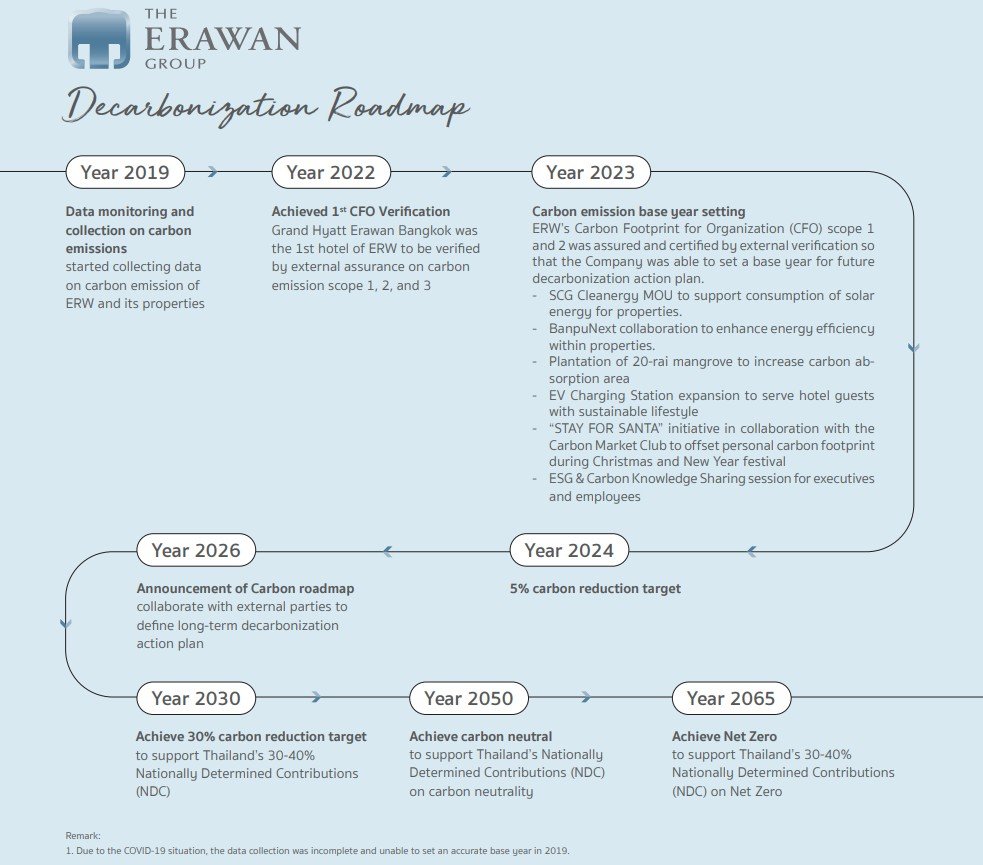
Climate Scenario Analysis
At The Erawan Group Public Company Limited (the Company), climate-related risks and opportunities are considered as part of our long-term strategic planning. Recognizing the potential implications of climate change for the hospitality and tourism sectors, the Company has integrated climate-related scenario analysis into our risk management framework to better understand potential impacts under different future conditions. Our approach draws on internationally recognized practices, such as the COSO Enterprise Risk Management Framework and the recommendations of the Task Force on Climate-related Financial Disclosures (TCFD), which provide useful guidance for assessing both transition and physical climate risks.
We internally plan and conduct both qualitative and quantitative climate-related scenario analyses across short-term (0–3 years), medium-term (4–10 years), and long-term (over 10 years) horizons to evaluate potential impacts on our assets, operations, and value chain. Physical scenarios such as RCP/SSP 2.6 (aligned with a 2°C or below pathway) as well as RCP/SSP 4.5 and 8.5 (above 2°C pathways) enable us to assess risks related to extreme weather, flooding, water scarcity, and heat stress across our hotel portfolio. Transition scenarios such as the IEA Net Zero Emissions by 2050, IEA Sustainable Development Scenario (2°C or below), and NGFS climate pathways allow us to assess policy, market, and regulatory developments that could influence energy use, carbon pricing, and customer preferences.
Insights from these scenario analyses inform our strategic responses, which include investing in renewable energy and energy efficiency, enhancing climate resilience of our properties, and developing sustainable hospitality offerings aligned with evolving guest expectations. The integration of climate scenario analysis into our strategy ensures that the Company remains resilient, adaptable, and well-positioned to create long-term value for stakeholders in a low-carbon and climate-resilient future.
Physical Climate Risks
As a hospitality company with operations located in diverse geographic settings, including urban centers, coastal destinations, and upcountry provinces—The Erawan Group faces potential exposure to a range of physical climate risks. These include flooding and heavy rainfall in Bangkok, storm surge and coastal erosion in seaside destinations, and drought and water scarcity in certain provincial areas. Rising temperatures and extreme heat events also represent emerging risks to guest comfort, employee safety, and operational efficiency.
To adapt to these risks, the Company has developed context specific measures that are integrated into both existing and planned operations. Examples include the installation of energy-saving equipment and environmentally friendly technologies, and the implementation of effective energy and water management systems across our hotel portfolio. Adaptation measures are prioritized for implementation within the next five years, supported by our Business Continuity Plan to minimize disruptions and safeguard stakeholder value.
The Erawan Group Physical Risk Assessment and Control Measures
The Company’s climate-related scenario analysis references IPCC AR6 pathways:
- RCP 2.6 / SSP1-2.6: Global temperature rise is projected to remain below 2°C by 2100, aligned with the Paris Agreement goal of below 2°C.
- RCP 4.5 / SSP2-4.5: Global temperature rise is projected at 2.5–3.0°C by 2100, exceeding the Paris Agreement target.
- RCP 8.5 / SSP3-8.5: Global temperature rise is projected at 4.0°C or higher by 2100, (significantly above 2°C, representing a business-as-usual case).
The Company assesses climate-related risks and opportunities across distinct time horizons:
- Near-term (to 2030): Covers immediate and emerging risks that may impact operations such as flooding and rising temperatures.
- Medium-term (to 2040): Covers intensifying risks, including heat stress, storm surges, and changes in customer preferences due to sustainability concerns.
- Long-term (to 2050): Covers systemic risks such as water scarcity and prolonged drought, as well as long-term implications of global transition pathways.
| Climate Risk Scenerio | Time frame | Likelihood | Impact | Risk Level | Description | Potential Business Impact | Adaptation measures |
|---|---|---|---|---|---|---|---|
| Flood | Short Term (0-3 years) | Medium | Medium | Medium | Heavy rainfall and flash floods in Bangkok and other flood-prone provinces may disrupt hotel operations, damage infrastructure, and limit guest and staff accessibility. Seasonal flooding from rivers and drainage constraints poses recurring risks to hotel assets in multiple regions. | Property damage, repair costs, increased insurance premiums, temporary loss of revenue due to service disruption. |
|
| Rising Temperatures / Heat Stress | Medium Term (4-10 years) | High | High | High | Rising average temperatures increase cooling demand, raising energy expenses and affecting guest comfort and employee safety. | Higher electricity costs, increased OPEX, potential impact on guest satisfaction and staff productivity. |
|
| Water Scarcity / Drought | Long Term (>10 years) | Medium | High | High | Hotels in provincial areas face risks of seasonal drought and limited water supply, affecting operations and costs. | Increased water costs, operational disruption, potential negative guest perception if water shortages occur. |
|
| Storm Surge and Coastal Erosion | Medium Term (4-10 years) | Low | Medium | Medium | Hotels in coastal areas such as Phuket, Hua Hin, and Pattaya face risks of storm surges, tropical storms, and shoreline erosion that could damage infrastructure and disrupt operations. | Potential structural damage to coastal hotels, increased repair/maintenance costs, higher insurance premiums. |
|
Remark: The assessment covers all operations in Thailand only.
Waste and food waste management
Target
- The Company aims to reduce of landfill waste
Business opportunities and risks
Opportunities
- Gain business opportunities in seeking new environmentally friendly supplies and amenities as well as facilities, so that hotels could differentiate from others and able to deliver new experience to hotel guests.
Challenges and risks
- Food waste is considered to be a significant global sustainability issue for the hospitality sector as it relates to natural resource consumption and global hunger concerns. It is a challenge for the Company to balance resource consumption, demand and satisfaction of customers in serving quality food at the right amount. In addition, it is crucial to consider food loss during preparation and food waste after consumption.
Management approaches
- Sort waste, especially types of waste that are significant to the hospitality sector such as food waste, as well as an increase in percentage of recyclable waste.
- Promote consumption of recyclable or recycled materials for hotel supplies and amenities.
- Exercise 4Rs principles; Reduce, Reuse, Recycle and Resourcing
- Collaborate with external partners to create sustainable waste journeys with optimum utilization of resources.
Performances
- 5 partnerships on waste management
- 29.30% reduction of food waste from ‘Zero Food Waste’ initiative
- 457.10 kg. of plastic waste was properly recycled
| Waste Management | Unit | Year 2022 | Year 2023 | Year 2024 |
|---|---|---|---|---|
| Total waste recycled/reused | metric tonnes | 184.63272 | 200.4403 | 570.2358 |
| Total waste disposed | metric tonnes | 678.18406 | 915.846 | 771.5717 |
|
metric tonnes | 187.19165 | 326.0654 | 766.1611 |
|
metric tonnes | - | - | 0.1800 |
|
metric tonnes | 490.99241 | 589.7806 | 5.2306 |
Food leftover and food waste management
The Company promoted ‘Zero Food Waste’ campaign in many hotels such as Grand Hyatt Erawan Bangkok where it started the campaign in May 2023 by encouraging their employees with no food leftover on their plate. The hotel could reduce food waste in the employees’ canteen by 29.30 percent after the first month of the campaign launched, and 12.44 percent average each month.
| Food Loss & Waste | Unit | Year 2021 | Year 2022 | Year 2023 | Year 2024 |
|---|---|---|---|---|---|
| Total weight of all food loss & waste | metric tonnes | 107.6 | 301.44369 | 389.22817 | 709.4413 |
|
metric tonnes | 44.14 | 301.44369 | 389.22817 | 406.2133 |
|
metric tonnes | 63.46 | - | - | 303.2280 |
Partnerships for leftover food and food waste management

Scholars of Sustenance Foundation (SOS) – a non-profit organization who pass on leftover food for charities and those under privileged
Partiticipating hotels
- Grand Hyatt Erawan Bangok
- JW Marriot Bangkok
- Courtyard by Marriot Bangkok
- Accor Hotels (Plan to join in 2026)

“Yindii” – a mobile application designed to re-sell bakery and pastries from hotel buffet line at a special prize to reduce foodwaste.
Participating hotels
- Grand Hyatt Erawan Bangkok
- JW Marriot Bangkok

The PLEDGE on Food Waste - a food waste management program Awarded hotel
Awarded hotel
- Courtyard by Marriott Bangkok (All-star level)
Plastic waste management
The Erawan Group and its properties say no to single-use plastic to reduce non-recyclable plastic waste which is now replaced by renewable products taking into consideration customer satisfaction in an attempt to reduce waste at its origin.
We also collaborate with SCG Chemical Co., Ltd and Corsair International Thailand to separate plastic waste for recycling purpose where 457.10 kilograms of waste were recycled.
Paper waste management
The Erawan Group’s head office and hotels in Bangkok together with our partner SCG Packaging Public Company Limited (SCGP) collect paper for recycling. We plan routes and collection dates to reduce transport energy.
Environmental Saving Report
ยอดกระดาษสะสมจาก 6 Locations ดังนี้
- ดิ เอราวัณ กรุ๊ป (โรงแรมเจดับบลิว แมริออท กรุงเทพ)
- ดิ เอราวัณ กรุ๊ป (โรงแรมเมอร์เคียว แบงค็อก สุขุมวิท 24)
- ดิ เอราวัณ กรุ๊ป (โรงแรมแกรนด์ ไฮแอท กรุงเทพ)
- ดิ เอราวัณ กรุ๊ป (โรงแรมไอบิส กรุงเทพ ริเวอร์ไซด์)
- ดิ เอราวัณ กรุ๊ป (โรงแรมคอร์ทยาร์ด กรุงเทพ)
- ดิ เอราวัณ กรุ๊ป (อาคารเพลินจิต)
รีไซเคิลกระดาษไปแล้ว (kg.)
Year 2023
Year 2024
Landfill waste management
The Company collaborated with external partners to effectively sort recycling waste in order to reduce landfill waste. Currently, the Company started collecting data of landfill waste of hotels in Bangkok Metropolitan Area and the Head Office.
Proportion of Total Waste
Biodiversity Management
The company aims to carry out the following biodiversity-related activities:
Sustainable biodiversity management requires an understanding of the balance between how to safeguard resources and how to use them efficiently. As a result, to cultivate a proper understanding of how one can seek appropriate benefits from the resources as well as how to effectively take care of them will remain an important principle not only to preserve and protect biodiversity, but also to support carbon management practices of the Company.
Year 2022
The Erawan Group Plc and hotels within the group planted 400 trees in Chatuchak Park, Benjakitti Park, and Mab Prachan Chonburi Reservoir.
The Naka Island Hotel, which is located at the Naka Island, Phuket, together with Pak Klok Sub-district Administration Organization, planted 2,500 mangrove seedlings within the island. The hotel also took part in the “Go Green” Project to collect 156.64 kilograms of waste from beaches and village areas.
Year 2023
In 2023, The Erawan Group planted 500 trees at a park closed to Khlong Toei MRT Station on the World Environment Day (5 June 2023) thanks to our collaboration with the Khlong Toei District, local volunteers, and other properties under the group. The tree-planting activity was attended by 86 staff.
Besides, we planted 15,000 mangrove trees on a 20-rai land at the community mangrove in Thong Kam Bay, Ban Laem Village, Tha Sala District, Nakhon Si Thammarat Province.
Year 2024
In 2024, The Erawan Group organized the annual “Erawan Group Tree Planting Initiative” at Suan 50 Suk Park in Khlong Toei District, Bangkok, in celebration of World Environment Day. In collaboration with the Khlong Toei District Office, local volunteers, and 92 employees from affiliated hotels, the company planted 200 trees, enhanced the landscape, and expanded green and recreational spaces for the community.
This initiative has been held annually, with over 1,000 trees planted to date. The company continues to work closely with both public and private sectors to support environmental efforts and promote sustainable green spaces across Thai society.
Our Commitment to Biodiversity
The Erawan Group recognizes that biodiversity is fundamental to the resilience of ecosystems and the sustainability of our hospitality business. We aim to manage both dependency-related and impact-related biodiversity risks across our operations and adjacent areas, in alignment with the UN Sustainable Development Goals, ensuring integration into the Group’s enterprise-wide risk management framework.
Biodiversity Risk Assessment
In 2024, the company conducted a comprehensive biodiversity risk assessment covering its own operations and adjacent areas using a location-specific approach. All 78 hotels operated in Thailand were assessed with the WWF Biodiversity Risk Filter (https://riskfilter.org), a corporate and portfolio level screening tool designed to identify biodiversity risks and prioritize corporate action. The WWF Risk Filter is aligned with leading global initiatives and reporting frameworks, including the Taskforce on Nature-related Financial Disclosures (TNFD), Taskforce on Climate-related Financial Disclosures (TCFD), Science Based Targets for Nature (SBTN), Carbon Disclosure Project (CDP), and the Global Reporting Initiative (GRI).
Biodiversity risks are embedded into the company-wide risk management processes under the Risk Management Committee, ensuring that both dependency-related risks (such as reliance on natural resources and ecosystem services) and impact-related risks (such as potential pressures on local biodiversity and ecosystems) are systematically considered.
Assessment results identified the Chao Phraya River and the Gulf of Thailand as areas of strategic importance for biodiversity stewardship, where both physical and reputational factors are most relevant. Of the 78 operational sites assessed in Thailand, 68 sites were identified as being in proximity to critical biodiversity areas or having significant biodiversity interactions. All assessed sites have biodiversity management considerations embedded within the Group’s risk management framework. Risks are evaluated across multiple categories, including provisioning services, ecosystem regulation, cultural services, biodiversity pressures, environmental, and socioeconomic factors. These insights enable the company to prioritize management actions and strengthen biodiversity programs in locations with higher ecosystem dependencies and stakeholder expectations.
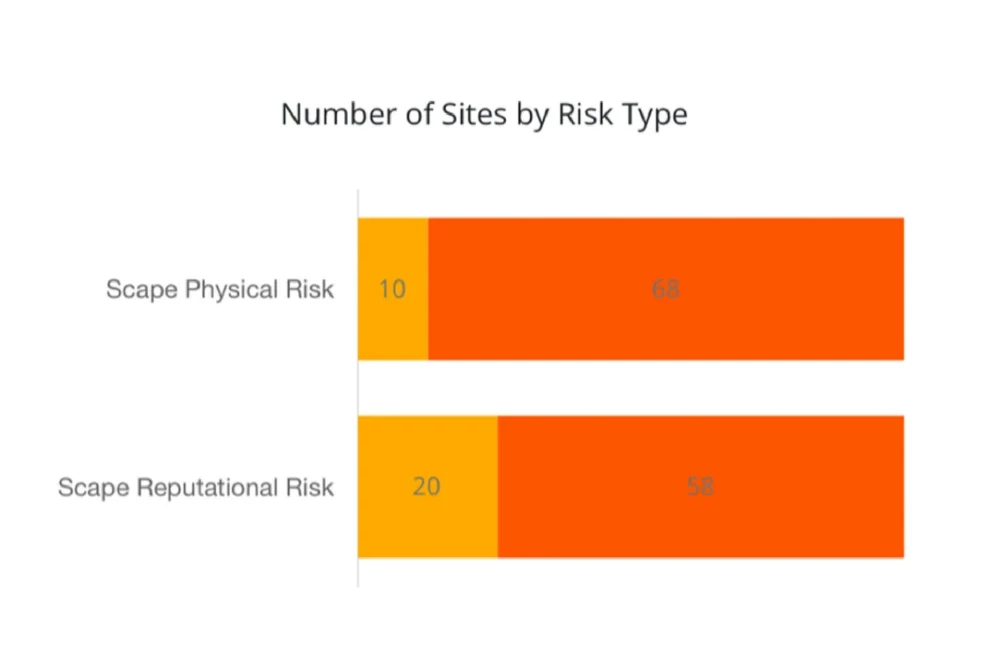
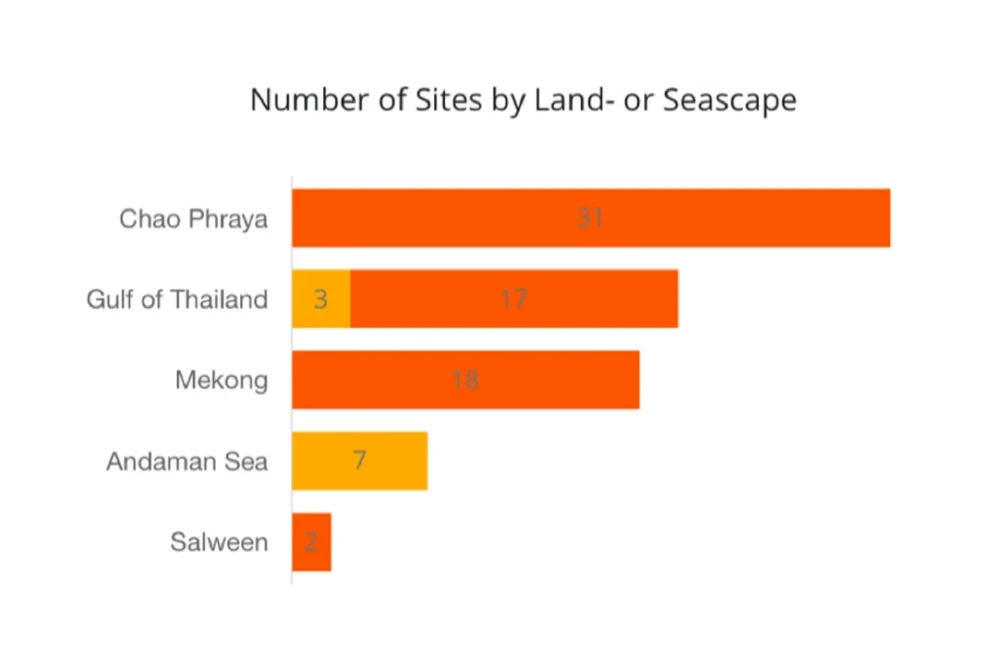
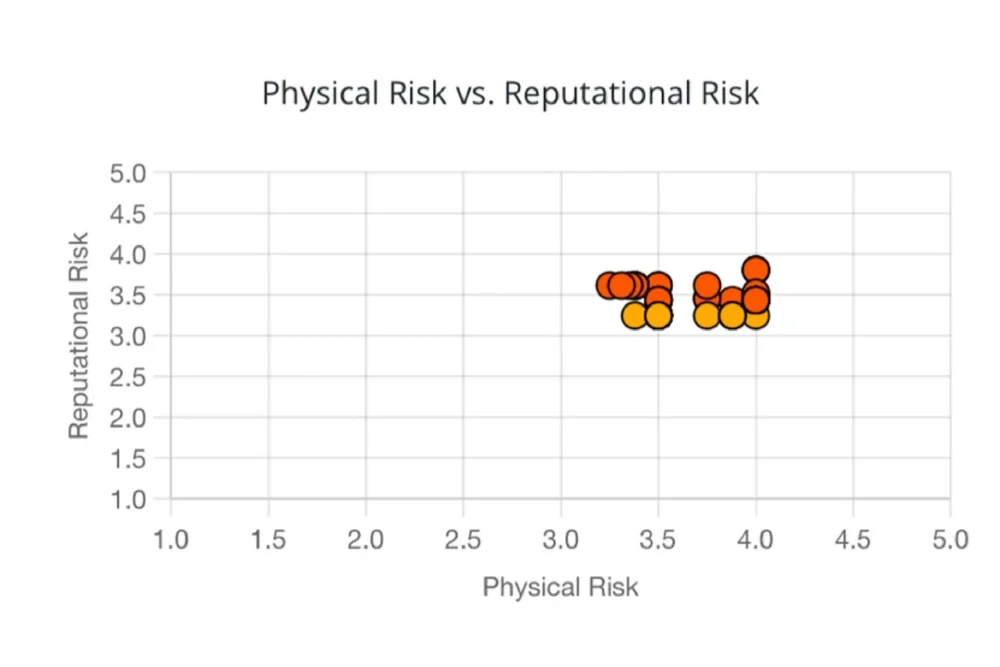
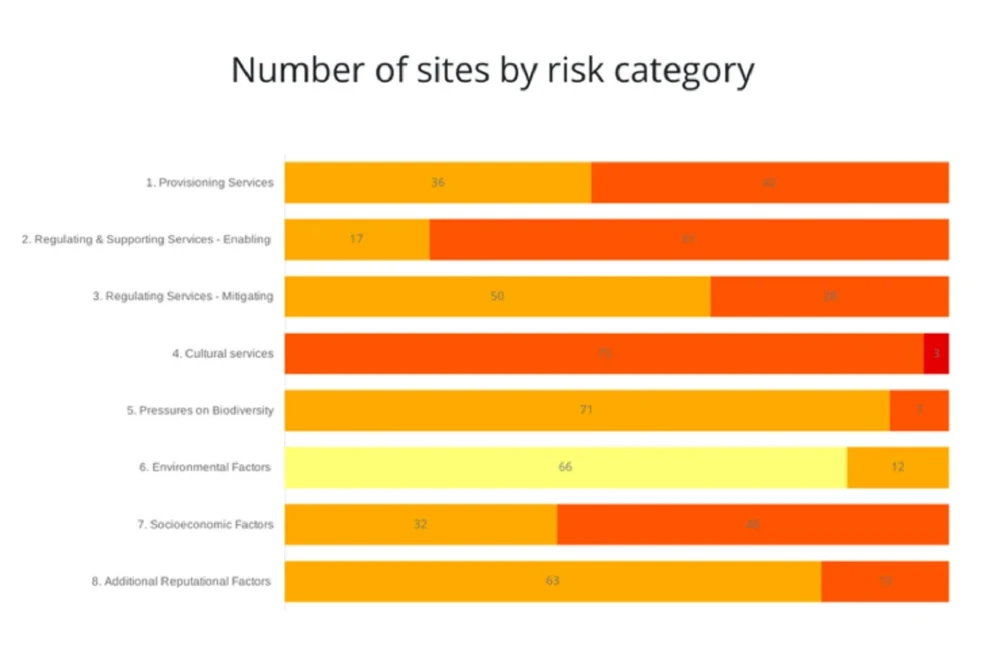
Biodiversity Mitigation Actions
The Erawan Group applies a hierarchy of actions to manage biodiversity risks and dependencies:
- Avoid: Site selection and operational planning minimize potential disturbance to critical biodiversity areas.
- Reduce: Hotels implement resource efficiency measures to reduce pressure on ecosystems, including water stewardship, energy conservation, and waste reduction.
- Regenerate & Restore: The company organizes the annual Erawan Group Tree Planting Project in collaboration with public and private partners. In 2024, 200 trees were planted at 50 Suk Park, Bangkok, enhancing green spaces, increasing carbon absorption, and improving community recreation areas.
- Transform: Through awareness programs, employee engagement, and partnerships with local authorities and communities, the company contributes to system-wide change in biodiversity conservation, aligning operations with national and global sustainability priorities.
